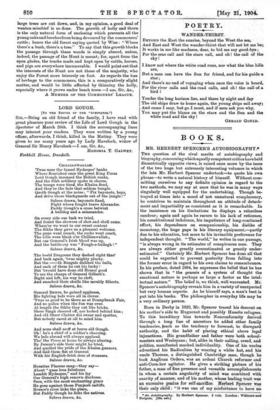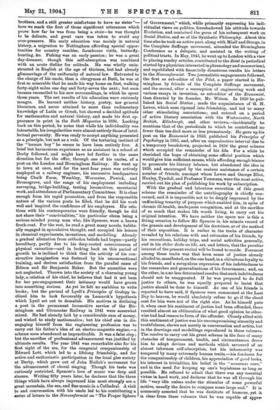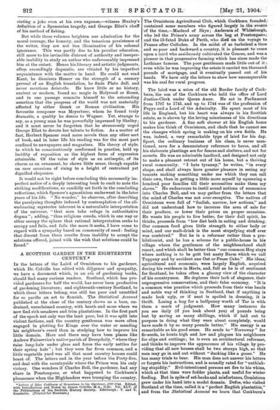BOOKS.
MR. HERBERT SPENCER'S AUTOBIOGRAPHY.* THE question of the rival merits of autobiography and biography, concerning which equally competent critics have held diametrically opposite views, is raised once more by the issue of the two huge but extremely interesting volumes in which the late Mr. Herbert Spencer undertook—to quote his own phrase—to write a natural history of himself. Without com- mitting ourselves to any definite opinion in regard to the two methods, we may say at once that he was in many ways singularly well equipped for the undertaking. Though be- trayed at times into a mood of not unnatural complacency, he contrives to maintain throughout an attitude of detach- ment and impartiality as consistent as it is remarkable. In the insistence on his limitations he displays a relentless candour; again and again he recurs to his lack of reticence, his constitutional indolence, his impatience of long-continued effort, his dependence on companionship, his dislike of monotony, the huge gaps in his literary equipment,—partly due to his education, but more to his invincible preference for independent thought. "The world," he writes in one passage, "is always wrong in its estimates of conspicuous men. They are always either greatly overestimated or greatly under- estimated." Certainly Mr. Herbert Spencer has done all that could be expected to prevent posterity from falling into the former error in regard to his own claims to remembrance. In his preface, dated 1894, he expresses the belief that he has shown that in "the genesis of a system of thought the emotional nature is perhaps as large a factor as the intel- lectual nature." The belief is, we think, well warranted. Mr. Spencer's autobiography reveals him in a variety of unexpected but very human aspects. As he himself says, a man's best is put into his books. The philosopher in everyday life may be a very ordinary person.
Born in Derby in 1820, Mr. Spencer traced his descent on his mother's side to Huguenot and possibly Hussite refugees. To this hereditary bias towards Nonconformity derived through a long line of ancestors he added other family tendencies, /such as the tendency to forecast, to disregard authority, and the habit of placing ethical above legal injunctions. His grandfather and father were both school- masters and Wesleyans ; but, alike in their calling, creed, and politics, manifested marked individuality. One of his uncles advertised his Radicalism by wearing a white hat, and his uncle Thomas, a distinguished Cambridge man, though he took Anglican Orders, was an ardent Church reformer and anti-Corn-law agitator. He gives a striking picture of his father, a man of fine presence and versatile accomplishments in whom a certain angularity of mind was combined with suavity of manner, and of his mother, whose leading trait was an excessive genius for self-sacrifice. , Herbert Spencer was their only child : "it was one of my misfortunes to have no An Autobiography. By Herbert Spencer. 2 vols. London : Williams and Norgate. [28s. net.] brothers, and a still greater misfortune to have no sister "— here we mark the first of those significant utterances which prove how far he was from being a stoic—he was thought to be delicate, and great care was taken to avoid any over-pressure. His early education was mainly in natural history, a migration to Nottingham affording special oppor- tunities for country rambles, farmhouse visits, butterfly hunting, &c. Fishing was an early passion ; he was a great day-dreamer, though this self-absorption was combined with an acute dislike for solitude. He was wholly unin- structed in English at the age of thirteen, but had already glimmerings of the uniformity of natural law. Entrusted to the charge of his uncle, then a clergyman at Bath, he was at first so miserable that he made his way home on foot, walking forty-eight miles one day and forty-seven the next ; but soon became reconciled to his new surroundings, in which he spent three years. The net results of his education were curiously meagre. He learned neither history, poetry, nor general literature, and never attained to more than rudimentary knowledge of Latin or Greek, but showed a decided aptitude for mathematics and natural history, and made his first ap- pearance in print in the Bath Magazine in 1836. Looking back on this period, he notes that while his individuality was intractable, his irregularities were almost entirely those of intel- lectual perversity. He was ready to accept anything presented as a principle, but not as a rule. Of the torturing instinct of the "human boy" he seems to have been entirely free. A brief but harmonious experience as an assistant in a school at Derby followed, and might have led further in the same direction but for the offer, through one of his uncles, of a post on the London and Birmingham Railway. He went up to town at once, and for the next four years was actively employed as a railway engineer, his successive headquarters being Chalk Farm, Wembley, Worcester, Powick, and Bromsgrove, and the range of his employment including surveying, bridge-building, testing locomotives, secretarial work, and attendance at Parliamentary Committees. It is clear enough from his rapid promotion, and from the responsible nature of the various posts he filled, that he did his work well and inspired the confidence of his employers. His rela- tions with his contemporaries were friendly, though he did not share their "convivialities," his particular chum being a serious-minded young man who, like Spencer, wore a brown frock-coat. For the rest, he read a great many novels, habitu- ally engaged in speculative thought, and occupied his leisure in chemical experiments, inventions, and modelling. Already a gradual alienation from orthodox beliefs had begun—partly hereditary, partly due to his deep-rooted consciousness of physical causation—and in looking back on this period of growth he is inclined to think that the activity of his con- structive imagination was fostered by his unconventional training, and derives satisfaction from the parallel cases of Edison and Sir Benjamin Baker. But the amenities were not neglected. Thrown into the society of a charming young lady, a relation of his chief, he believes that had it not been for her pre-engagement their intimacy would have grown into something serious. As yet he felt no ambition to write books ; but the perusal of Lyell's Principles of Geology in- clined him to look favourably on Lamarck's hypothesis which Lyell set out to demolish. His motives in declining a post in the permanent locomotive service of the Bir- mingham and Gloucester Railway in 1841 were somewhat mixed. He had already laid by a considerable sum of money, and wished to study mathematics ; but his chief aim in dis- engaging himself from the engineering profession was to carry out his father's idea of an electro-magnetic engine,—a scheme soon abandoned as impracticable. It was a false step ; but the sacrifice of professional advancement was justified by ultimate results. The year 1841 was remarkable also for his first sight of the sea, for the congenial companionship of Edward Lott, which led to a lifelong friendship, and for active and enthusiastic participation in the local glee society at Derby, which grew out of John Hullah's movement for the advancement of choral singing. Though his taste was curiously restricted, Spencer's love of music was deep and sincere. Writing fifty years later, he declares that the three things which have always impressed him most strongly are a great mountain, the sea, and fine music in a Cathedral. A visit to and conversation with his uncle led to his contributing a Series of letters to the Nonconformist on "The Proper Sphere
of Government," which, while primarily expressing his indi- vidualist views on politics, foreshadowed his attitude towards Evolution, and contained the germ of his subsequent work on Social Statics, and so of the Synthetic Philosophy. About this time also he took an active part, along with Miall and Sturge, in the Complete Suffrage movement, attended the Birmingham Conference as a delegate, and assisted in the writing of political tracts. In May, 1843, he went up to London with a view to placing sundry articles, contributed to the Zoist (a periodical started by a physician interested in phrenology and mesmerism), and republished with financially disastrous results his letters to the Nonconformist. Two journalistic engagements followed, the first as sub-editor of the Pilot, a paper started in Bir- mingham by friends of the Complete Suffrage movement, and the second, after a resumption of engineering work and various essays in invention, as sub-editor of the Economist, then directed by its founder, Mr. Wilson. In 1850 he pub- lished his Social Statics ; made the acquaintance of G. H. Lewes, which soon ripened into friendship, and led to many other stimulating associations ; and entered on a period of active literary association with the Westminster, North British, Edinburgh, and other reviews,—incidentally he mentions that of the periodicals to which he contributed no fewer than ten died more or less prematurely. He gave up his post on the Economist in 1853, published his Principles of Psychology in 1855, and, after an unproductive interval due to a temporary breakdown, projected in 1858 the great scheme which occupied the remainder of his life. For a while he cherished the hope of obtaining some official position which would give him sufficient means, while affording enough leisure to prosecute his literary labours, but abandoned the idea in 1859, and encouraged by the zealous assistance of a certain number of friends, amongst whom Lewes and George Eliot, Huxley, Tyndall, and Professor Youmans, were the most active, carried out his plan of publishing his work by subscription.
With the gradual and laborious execution of this great scheme the remainder of the autobiography is chiefly con- cerned, and it is impossible not to be deeply impressed by the unflinching tenacity of purpose which enabled him, in spite of chronic ill-health, inadequate recognition, and at the sacrifice of so much that makes life worth living, to carry out his original intention. We have neither the space nor is this a fitting occasion to follow Mr. Spencer in his minute record of the genesis and development of his doctrines, or of the method of their exposition. It is rather in the traits of character revealed by his relations with and estimates of his friends, by his recreations, holiday trips, and social activities generally, and in his obiter dicta on life, art, and letters, that the peculiar interest of the present recital will be found to reside. Foremost among these traits was that keen sense of justice already alluded to, manifested, on the one hand, in a chivalrous loyalty to his friends, and a scrupulous expression of his indebtedness to the researches and generalisations of his forerunners ; and, on the other, in a no less determined resolve that such indebtedness should not be exaggerated. If he was prepared to do full justice to others, he was equally prepared to insist that justice should be done to himself. As one of his friends is reported to have said, if Spencer were summoned at the Last Day to heaven, be would absolutely refuse to go if the cloud sent for him were not of the right size. As he himself puts it, when once his sentiment of justice had been offended, there resulted almost an obliteration of what good opinion he other- wise had had reason to form of the offender. Closely allied with this sentiment of justice was his uncompromising sincerity and truthfulness, shown not merely in conversation and action, but in the drawings and modellings reproduced in these volumes. The resolve to carry out his great scheme in the face of many obstacles of temperament, health, and circumstances drove him to adopt devices and methods which savoured of an almost inhuman self-absorption, but his inhumanity was tempered by many extremely human traits,—his fondness for the companionship of children, his appreciation of good looks, his interest in trivialities, his belief in the "nonsense cure," and in the need for keeping up one's boyishness as long as possible. He refused to admit that there was any essential virtue in bard work, and declares that he was all through his life "very idle unless under the stimulus of some powerful motive, usually the desire to compass some large end." It is commonly asserted that be was destitute of humour, yet it is clear from these volumes that he was capable of appre•
But while these volumes heighten our admiration for the moral courage, the honesty, and the tenacious persistence of the writer, they are not less illuminative of his colossal ignorance. This was partly due to his peculiar education, still more to his invincible distrust of authority and insuper- able inability to study an author who unfavourably impressed him at the outset. Hence his literary and artistic judgments, often exceedingly dogmatic, are vitiated by his imperfect acquaintance with the matter in hand. He could not read Kant, he dismisses Homer on the strength of a, cursory perusal of an English translation, he finds Plato dull, and never mentions Aristotle. He knew little or no history', ancient or modern, found no magic in Holyrood or Rome, and in one paseage commits- himself to the astounding assertion that the progress of the world was not materially affected by either Greek or Roman civilisation. His favourite composer was Meyerbeer, whom he found truly dramatic, a quality he denies to Wagner. Yet, strange to say, as a young man he was powerfully impressed by Shelley; and it must never be forgotten that he strenuously urged George Eliot to devote her talents to fiction. As a matter of fact, Herbert Spencer read more novels than any other sort of book, and in later life his reading was for the most part confined to newspapers and magazines. His theory of style, to which he conscientiously conformed in practice, held up lucidity of exposition as the highest form of expression attainable. Of the value of style as an antiseptic, of its charm as an ornament, he shows little sense, though capable on rare occasions of rising to a height of restrained yet dignified eloquence.
It would not be right before concluding this necessarily im- perfect notice of a deeply interesting book to omit to note the striking modifications, so candidly set forth in the concluding reflections, which Spencer's agnosticism underwent in the later years of his life. "No wonder," he observes, after describing the paralysing thoughts induced by contemplation of the all.. embracing mysteries inherent in a naturalistic interpretation of the universe, "that men take refuge in authoritative dogma"; adding, "thus religious creeds, which in one way or other occupy the sphere that rational interpretation seeks to oecupy and fails, and fails the more it seeks, I have come to regard with a sympathy based on community of need : feeliUg that dissent from them results from inability to accept the solutions offered, joined with the wish that solutions could be fpund."
A SCOTTISH GARDEN IN THE EIGHTEENTH CENTURY.*




































 Previous page
Previous page